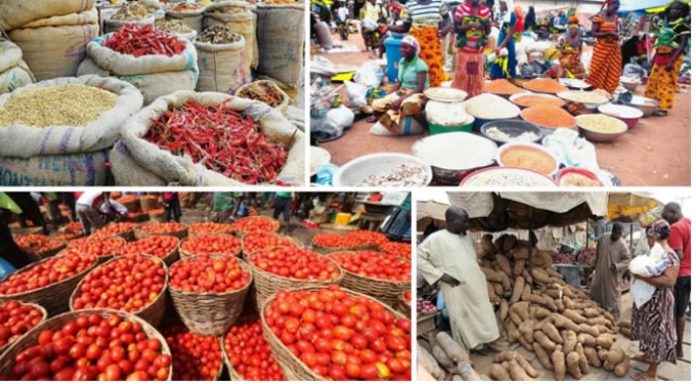A Professor of Plant Pathology, Owolade Oluwaferanmi, on Wednesday linked the activities of middlemen and market associations to the constant hike in food prices in Nigeria.
Oluwaferanmi, of the Institute of Agricultural Research and Training (IAR&T), Ibadan, revealed this in an interview with the News Agency of Nigeria (NAN) in Ibadan on Wednesday.
He said it was unfortunate that middlemen and market associations had kicked aside farmers in determining food prices. “These people go to the farmers to buy at cheaper rates and meet at their associations to fix prices of food items in the market,” he said.
Oluwaferanmi, therefore, called on the government to check their activities to address the frequent increase in food prices.
The professor also said that Nigeria’s lack of storage facilities was another factor responsible for the high cost of food commodities.
He said that due to the lack of storage facilities, most farm produce end up wasted after harvesting.
According to him, the governments of the developed countries provide storage facilities where they store farm produce bought from the farmers.
“During the time of scarcity, the government will bring out the stored food commodities and this will bring down prices of food, and at the same time, reduce the influence of middlemen in the supply chain,” he said.
Contrarily, the Oyo State Chairman of the All Farmers Association of Nigeria (AFAN), Mr Abass Adewumi, said activities of middlemen and market associations contribute insignificantly to the high cost of food.
Adewumi identified the high cost of farm inputs, farmland tractorisation and transportation of farm produce as major contributors to the high cost of food items.
“The rate at which we tractorise an acre of land before was N15,000, but now it is N35,000. The herbicide we used to buy for N1,500 is now N4,000, while a bag of fertiliser is now between N45,000 and N50,000. A kilogramme of maize is now between N3,500 and N7,000,” Adewumi said.
He said the amount spent during farm production would eventually be spread on the yield, thus leading to a high cost of food in the market. The chairman called on the government to come to their aid by subsidising farm inputs and other things used in the farming process.
He said the association had tried as much as possible to make the required farm storage facility available but had not achieved much.
“Farm produce like yam, tomatoes and others require a standard storage facility that would at least elongate the lifespan of the produce.
“Produce like tomatoes need to be subjected to a very cool area and many associations cannot boost of getting a cold room for farmers to store their tomatoes; it is the government that can assist on that,” he said.
According to him, the turnout of farm produce is in excess during the rainy season, hence the required storage facilities for farmers.
Adewumi said that the availability of storage facilities would reduce wastage and the high cost of food commodities, particularly during the dry season.
Meanwhile, food traders and consumers in Ibadan have denied the reduction in food prices, urging the government at all levels to arrest the situation. The respondents told NAN that pepper, yam and plantain were still expensive despite being in their season.
A consumer, Mrs. Ibidun Keyede, said a family of four could hardly cook with tomato and pepper worth N1,500.
Keyede said, “We are in the season of plantain; four pieces now sell for N1,000 compared with the same sold for N300 in 2023.
“Three tubers of yam sell for N5,000, making consumers shift to sweet potato, which is also now expensive. A small basket of sweet potato is now N6,000 compared to a bag of it at N5,000 in 2023.”
Keyede urged the Oyo State and the 33 Local Governments to utilise the abundant arable lands in the state for mechanised farming and irrigation systems instead of establishing housing estates for the rich. This, she said, would save its citizens from hunger.
Mrs. Kehinde Adigun, who buys from farmers to resell, said chilli pepper, sold between N8,000 and N12,000 in 2023, could not be compared to a small basket of N14,000 today. According to her, the same was sold for N21,0000 at the Omi-Adio farmers’ market some days ago.
Adigun said a small basket of tomatoes, which sold between N17,500 and N20,000 during the Eid-el-Kabir festival in June, had dropped to N5,500 due to its perishable nature.
“A bag of dry onions now sells for N160,000 compared to between N25,000 and N40,000 in 2023. A bag of new onions is now N100,000,” said Adigun.
Another food marketer, Mrs Folake Olorode, said the season of Yoruba pepper was winding up. By October, the Hausa pepper will be out. It is, relatively, plenty in the market now because farmers bring it to markets in large quantities to earn their daily bread,” said Olorode.
A farmer, Mr. Emmanuel Dosu, said the harvest of most food crops was low because of insufficient rainfall.
“Nevertheless, a farmer who needs money to feed his family will take his farm produce to sell to cater for his needs. Only a large-scale farmer can store his harvest, which is being hindered by insecurity in the state and cattle eating the farm produce.
“These two factors affected feed production negatively and led to the hike in food prices. It has affected poultry generally, while others have shut down businesses,” said Dosu.
He said with drought in the south and flood in the north, only the government and a big-time produce merchant could buy produce in large quantities, storing up for sustainability. (NAN)


